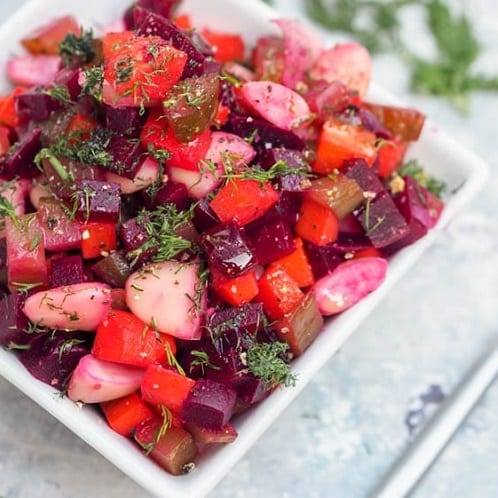Introduction: Dietary restrictions and Russian cuisine
Russian cuisine is known for its hearty and filling dishes, often featuring meats, potatoes, and bread. However, for those with dietary restrictions such as gluten intolerance, vegetarianism, or dairy allergies, it can be challenging to find suitable options. Fortunately, there are many delicious Russian dishes that can be modified to accommodate these restrictions.
Gluten-free Russian dishes
Many traditional Russian dishes are made with wheat or other gluten-containing grains, such as blini (Russian pancakes) or pelmeni (dumplings). However, there are also plenty of gluten-free options to enjoy, such as borscht (beet soup), shashlik (grilled meat skewers), or golubtsy (cabbage rolls filled with meat and rice). Additionally, many Russian salads, such as Olivier or vinaigrette, are naturally gluten-free.
Vegetarian Russian dishes
Vegetarianism is not as common in Russia as it is in some other countries, but there are still many dishes that can be enjoyed without meat. One popular option is kasha (buckwheat porridge), which is often served with sautéed mushrooms and onions. Blini can also be made without eggs or filled with vegetarian options such as cottage cheese or mushrooms. Another favorite is pirozhki (small hand pies), which can be made with fillings such as cabbage, potatoes, or cheese.
Vegan Russian dishes
Veganism is also becoming more popular in Russia, and there are plenty of dishes that can be enjoyed without animal products. One classic Russian dish is vareniki (dumplings filled with potatoes or mushrooms), which can be made without eggs or dairy. Another popular option is solyanka (a sour soup made with pickles and vegetables), which can be made with vegetable broth instead of meat. Finally, many Russian salads can be easily made vegan, such as the refreshing cucumber and dill salad.
Russian dishes for those with dairy restrictions
Dairy products are commonly used in Russian cuisine, but there are still many options for those with dairy restrictions. Soups such as shchi (cabbage soup) or rassolnik (pickle soup) can be made without sour cream. Pelmeni can be filled with meat and vegetables instead of cheese, and blini can be made with non-dairy milk. Additionally, there are many delicious Russian desserts that can be made without dairy, such as the sweet and tangy kissel (fruit dessert) or the nutty and chewy halva.
Conclusion: Delicious and satisfying Russian cuisine for everyone
Whether you have dietary restrictions or not, Russian cuisine has something for everyone to enjoy. From hearty soups and stews to delicate salads and desserts, there are many delicious dishes to try. With a little modification, traditional Russian cuisine can be enjoyed by those with gluten intolerance, vegetarianism, veganism, or dairy allergies. So why not try something new and explore the flavors of Russia?

